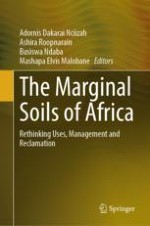2024 | OriginalPaper | Chapter
Remediation Strategies That Can Be Adopted to Reclaim Degraded Soils in the Communal Areas of Zimbabwe
Authors : Cosmas Parwada, Justin Chipomho
Published in: The Marginal Soils of Africa
Publisher: Springer Nature Switzerland
Activate our intelligent search to find suitable subject content or patents.
Select sections of text to find matching patents with Artificial Intelligence. powered by
Select sections of text to find additional relevant content using AI-assisted search. powered by
